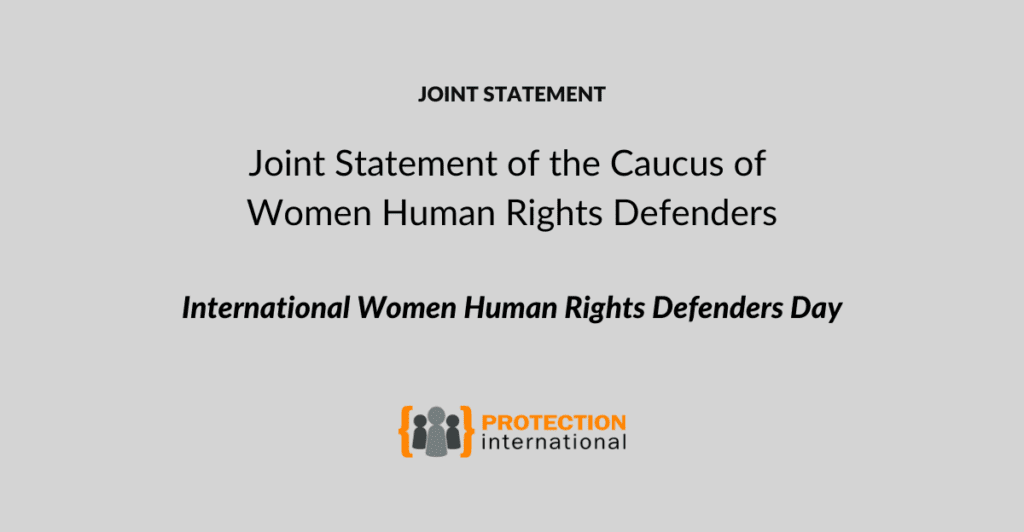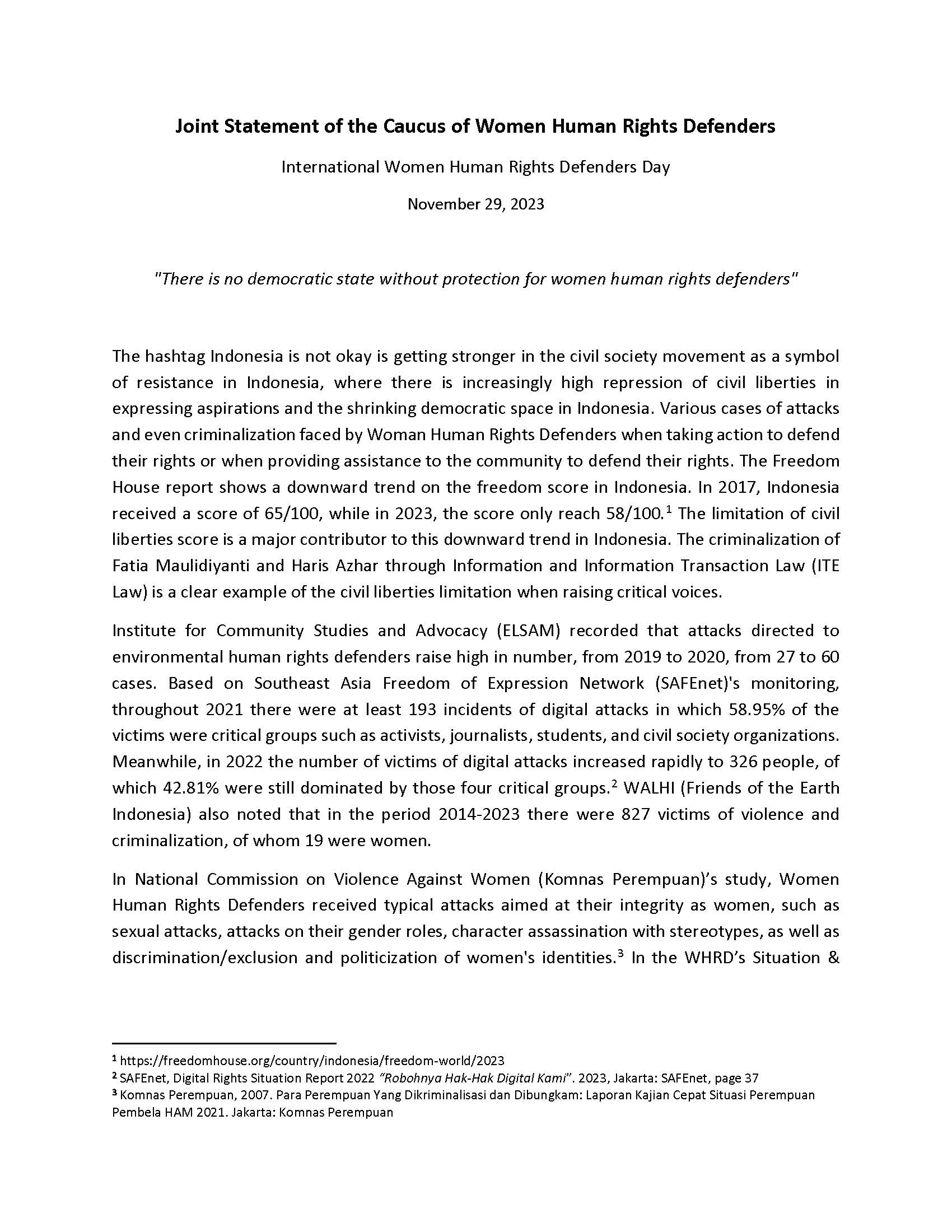International Women Human Rights Defenders Day
November 29, 2023
“There is no democratic state without protection for women human rights defenders”
The hashtag Indonesia is not okay is getting stronger in the civil society movement as a symbol of resistance in Indonesia, where there is increasingly high repression of civil liberties in expressing aspirations and the shrinking democratic space in Indonesia. Various cases of attacks and even criminalization are faced by women human Rights Defenders when taking action to defend their rights or when assisting the community to defend their rights. The Freedom House report shows a downward trend in the freedom score in Indonesia. In 2017, Indonesia received a score of 65/100, while in 2023, the score only reached 58/100.1 The limitation of the civil liberties score is a major contributor to this downward trend in Indonesia. The criminalization of Fatia Maulidiyanti and Haris Azhar through Information and Information Transaction Law (ITE Law) is a clear example of the civil liberties limitation when raising critical voices.
Institute for Community Studies and Advocacy (ELSAM) recorded that attacks directed at environmental human rights defenders were high in number, from 2019 to 2020, from 27 to 60 cases. Based on the Southeast Asia Freedom of Expression Network (SAFEnet) monitoring, throughout 2021 there were at least 193 incidents of digital attacks in which 58.95% of the victims were critical groups such as activists, journalists, students, and civil society organizations. Meanwhile, in 2022 the number of victims of digital attacks increased rapidly to 326 people, of which 42.81% were still dominated by those four critical groups.2 WALHI (Friends of the Earth Indonesia) also noted that in the period 2014-2023, there were 827 victims of violence and criminalization, of whom 19 were women.
In the National Commission on Violence Against Women (Komnas Perempuan) study, Women Human Rights Defenders received typical attacks aimed at their integrity as women, such as sexual attacks, attacks on their gender roles, character assassination with stereotypes, as well as discrimination/exclusion and politicization of women’s identities. In the WHRD’s Situation &
1 https://freedomhouse.org/country/indonesia/freedom-world/2023
2 SAFEnet, Digital Rights Situation Report 2022 “Robohnya Hak-Hak Digital Kami”. 2023, Jakarta: SAFEnet, page 37
3 Komnas Perempuan, 2007. Para Perempuan Yang Dikriminalisasi dan Dibungkam: Laporan Kajian Cepat Situasi Perempuan Pembela HAM 2021. Jakarta: Komnas Perempuan
Rapid Assessment in 2021, Komnas Perempuan stated that in general, Human Rights Defenders experience attacks, intimidation, or threats such as (1) violence and threats of physical violence;
(2) psychological violence/intimidation; (3) character assassination, for example, is considered as ‘provocateurs’, ‘traitors to the state’, ‘separatists; (4) being legally charged by perpetrators or authorities; (5) ostracism and silencing efforts; and (6) destruction of livelihoods. It is also found that many WHRDs were intimidated by their families (husbands or children).
“Since 20 years ago, when I started actively advocating mining cases in North Sulawesi until today, the protection situation for Human Rights Defenders is still very minimal, even though the attacks are increasingly diverse, especially through digital attacks, what happened to me for example, my cellphone was hacked and could no longer be used,” said Jull Takaliuang, a Woman Human Rights Defender and Coordinator of Save Sangihe Island in Indonesia.
The passing of the new Criminal Code and Government Regulation as Law Replacement No.2 of 2022 on Job Creation, is suspected to have the potential to increase the criminalization of Human Rights Defenders. “In addition, the revision of the ITE Law, which is expected to respond to various problems that result in the criminalization of HRDs, is not expected to change the situation much. The revision, which was carried out behind closed doors and did not involve the public will make the freedom of expression situation even worse by giving wider discretion to the government to block internet access without clear accountability,” said Rifqi S. Assegaf, Director of KEMITRAAN’s Democratic Justice Governance Reform.
However, several regulations have the opportunity to protect WHRDs, for example, Article 66 of Law No.32 of 2009 concerning Environmental Protection and Management which regulates Anti Strategic Lawsuits Against Public Participation (Anti SLAPP), and Law No.12 of 2022 concerning Criminal Acts of Sexual Violence.5 The protection of Environmental Human Rights Defenders is also stated in the Supreme Court Regulation No. 1 of 2023 concerning Legal Protection of Environmental Rights Defenders and Prosecutor’s Guidelines No. 8 of 2022 concerning Handling Environmental Cases.
Twenty-five years of reformation has not yet provided good hope for the resolution of human rights cases and the protection of human rights defenders, especially women human rights defenders. Efforts to demand truth and justice, often face impunity efforts exhibited by the ruling regime, which prefers political calculations and power, rather than law enforcement. Mrs. Sumarsih, an activist of the Kamisan action stated, “There have been more than 796 Kamisan actions, knocking on the door of The Palace, so that the state is present and dares to resolve cases of human rights violations, but this has not been fulfilled. As mothers and women“
4 Komnas Perempuan, 2021. Para Perempuan Yang Dikriminalisasi dan Dibungkam: Laporan Kajian Cepat Situasi Perempuan Pembela HAM 2021. Jakarta: Komnas Perempuan
5 Research can be downloaded from https://kemitraan.or.id/book/perempuan-pembela-hak-asasi-manusia-lingkungan-hidup- ancaman-regulasi-dan-rekomendasi-perlindungan/
human rights defenders, the attacks on our struggle are not only stigmatized because we are women, but also the assumption that our advocacy is ridden by the interests of certain parties. If the state has neglected to investigate and resolve past human rights cases, how can we expect other human rights cases to receive justice?”
The Caucus of Women Human Rights Defenders in a series of campaigns for 16 Days of Activism Against Gender-based Violence and the commemoration of International Women Human Rights Defenders Day on November 29th, 2023, urges the Indonesia government to:
- Seriously fulfills its responsibility to respect, protect, and fulfill human rights as well as protect women human Rights Defenders (WHRDs) through human rights-based; legislation, development, investment, and law enforcement.
- Establish a comprehensive, inclusive, and gender-perspective protection mechanism for Woman Human Rights Defenders.
- Revise/amend Human Rights Law No. 39/1999 to include articles on the protection of Human Rights Defenders and strengthen the authority of Human Rights Institutions.
- Urge the government and the House of Representatives to open the second revision document of the ITE Bill transparently involve public participation, and postpone the ratification until all problematic articles that have been used to criminalize and silence Woman Human Rights Defenders are thoroughly discussed and no longer have the potential to violate human rights and WHRDs. These articles include Article 26 paragraph 3, Article 27 paragraph 1 to Article 45 paragraph 3, Article 27 paragraph 3 jo Article 45
paragraph 3, Article 28 paragraph 2 jo Article 45A paragraph 2, Article 29 jo Article 45B,
Article 36 jo Article 51 paragraph 2, Article 40 paragraphs 2a and 2b, Article 43 paragraphs 3 and 6.
- Make operational regulations on article 66 of Law No. 32 of 2009 concerning Environmental Management and Protection which regulates Anti Strategic Lawsuit Against Public Participation (Anti SLAPP) with a meaningful participation process and contains gender-equitable substance. In the current context, specifically guaranteeing legal protection and freeing Fatia Maulidiyanti and Haris Azhar from criminal charges is an application of the anti-slAPP policy.
- Include the protection of Human Rights Defenders and WHRDs as part of the development focus in the National Long-Term Development Plan 2025-2045 to the National Medium-Term Development Plan 2025-2029.
- Reform of the legal system and legal institutions and human rights-related capacity building for state institutions and apparatus, including an end to the use of violence and criminalization of HRDs and WHRDs by law enforcement officials.



 Statement
Statement